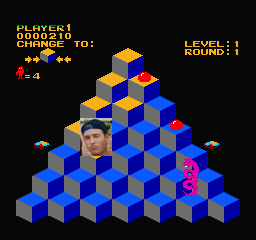Ask yourself: What is the single most basic human need? There are a lot of needs and I suppose they do coalesce somewhat into a hierarchy—starting with what will keep me alive and for how long and morphing into what will make my life enjoyable (ie what will make me think least about the fact that I will die sooner or later), and probably ending with something like “what will make my life meaningful?”
But, anyways, if you said that anything other than oxygen is the most basic human need, I must call you crazy and disagree. If you can’t breathe you can’t eat. You can’t pay rent. You can’t, for more than at most 60 seconds, ponder your existence.
“Bullshit. Bullshit. Bullshit.”
“Down again?”
“Down. Dead. Ridiculous.”
“It works for me. It’s quite fast actually. See, look I’m watching a video.” I smirked.
“Well, fuckin’ A. It doesn’t work for me.” Mr. Yang has the foulest mouth in the history of second grade teachers. He’s an epic malcontent—a man so irritable he is irritable about how irritable he is. “I’m so pissed off today. It’s pissing me off.”
On a cold day: “Freezing my damn balls off. Everyday. Cold. Bullshit.”
On a hot day: “Sweating like a pig. No AC. Bullshit.”
On the most beautiful day in recorded history: “Clear blue sky, billowy white clouds, soft breezes cascading off the early spring harvest, butterflies alighting to caress my face. Buncha bullshit if you ask me.”

Today, Mr. Yang is pissed off at the teacher’s lounge wifi, which was installed a few weeks ago. He’s not the only one. Most teachers have been complaining about its efficiency since the day this particular series of tubes was tubed-up. In most cases—Mr. Yang turned out to be no exception—the teachers had simply neglected to enable wifi on their phone. I instructed Mr. Yang how one might do that. He began to flash a smile, but quickly shook his head and remarked on the inherent and profound bullshit coursing through the situation.
Now, obviously, there is something that needs to be addressed between the bullshit. A month ago, there was no wifi in the teacher’s lounge.
There’s this interesting interplay in life, one that plays differently based on different inputs. That’s the interplay between wants and needs. On a macro, societal, human level, the interplay between wants and needs is a complex series of promotions and demotions—a rather fluidly progressing shift in perceptions and expectations. How we distinguish—honestly distinguish—between the two tells a great chunk of the story of our societies and us.
One thing is clear about this interplay: It is much harder to go one way than the other. Promoting a want to a need (expectation works too if need seems to strong) is a satisfying process. It’s nice. It means things are better than they were. The prospect of demoting a need to a want is the type of shit that people fight wars over to avoid. No oxygen, no wars. No food, no politics.
I’ve thought about this more than I’ve thought about nearly anything during these last couple years. And that’s probably due to a rather drastic recalibration of my wants and needs—a shift in my expectations for my world. Obviously, my revision has been tangibly downward. I need less. It’s less a function of self than circumstance. To rapid fire a few things that have gone from habit to afterthought: Internet, heating/cooling, daily showers, consistent access to food, weekly showers, infrequent but existent sex, a new outfit everyday, clean water, sitting down to poop, refrigeration, driving……. Are any of these things people need? Obviously, the answer is no. Are these things people need as certain societies are presently constructed? That’s a little more complex, but yeah, probably.

Even during these two years—as I have reconsidered the interplay—I have witnessed a lot of those wants being gradually converted into needs on a grander scale. Boxes checked off, one by one, signaling “progress.” Ding, ding, and ding. Half the teachers at my school bought new cars and learned to drive. We installed a flushing toilet (https://tloebchina.wordpress.com/2014/12/14/commode/) We got that bullshit wifi. Slowly, where there was once nothing, there emerges that which one cannot live without. Crazy. So quick. Kind of, in many ways, like hard drugs. Once you get a taste, you’re fucked. It’s a lot easier to live without them until you’ve lived with them.
I went to India last summer. India and China are special analogs. Similar in perhaps only that they both have a whole lot of people and are both romanticized by hygienically challenged Brits in dreads and parachute pants. One thing struck me pretty hard though: India, economically speaking, is in a different universe than China. Compare Shanghai with Mumbai. Compare Yunnan (where I live), one of the poorer parts of China, with the Indian countryside. There is almost nothing to compare. To be clear, there is still intense poverty in China. But, I couldn’t help feeling that it was a little—nah, a lot—different.
Lately, I’ve been hearing an uptick in a different kind of need. I’m not going to go into it too much until I’m back under the watchful eye of the NSA and not the PRC. But, you can venture to guess what it might be. It’s got something to do with that third type of need/entitlement/expectation. The one about meaningfulness—fulfillment of self. It’s another area where India and China are very different. One’s system is inherently considered right. The other, scary and dangerous. It’s a thought I couldn’t disengage myself from after seeing family upon family of shoeless, clothes-less kids on the streets of India’s biggest cities. What, I often thought, are the priorities here?
Everyone has their own kneejerk reaction to stuff like “communism” (quote unquote because what they’ve got here isn’t really that), human rights, will of the people, freedom. These are issues of great importance. They cause wars and highly intelligent/intellectual/well thought out/factually-supported debates on the Internet. They are inarguable dogma to most everyone. But, where do they fit on the hierarchy? Would you rather eat, would you rather sleep in a bed, would you rather have a road from your tiny village to the hospital 20 miles away, or would you rather have the right to say, talk about all the idiots in congress and choose the president? Please do not for a moment think I am advocating for less rights. Each and every government in the world deserves to be subject to their iteration of the first amendment. I am not trying to speak for anyone. I am simply trying to ask some questions—analyze some of the stuff I’ve seen. In many instances, you can have both basic needs and basic freedoms! But just think about the choice. If you had to choose? Where is the line? Where is your line? Perhaps if you have never been hungry, if you have never slept on the street, you—like me—are unqualified to draw one.
We are lucky, many of us, that we will never have to draw this line. Many of our revolutions have already happened. But, there will be more.
Oxygen–the kind that isn’t bound to two hydrogens. That’s all I would think about if you tied me up to a bunch of cinderblocks and tossed me overboard—not dinner, not the Keystone Pipeline, not whether or not the wifi password is capitalized. This is obvious, perhaps a little preachy. But, it’s just a good starting point. It scales up rather smoothly. Check the box, move on. Check the box, move on. That’s kind of what we do, how we measure our progress. We check a box and then start searching for the next one—kind of like leveling up in Q-Bert or something. You can’t just go skipping around all out of order, it’s against the rules! Maslow would be pissed. You can’t be stressing about cancelling your colonoscopy when you’re underwater. That would be a pretty depressing last thought, anyway.

Where is your line? Are you lucky enough to be able to choose your line?
It’s been pretty damn fascinating to watch how quickly a new status quo takes hold and becomes something of an inalienable foundation for living in the world—how stuff that didn’t even exist seems to materialize out of thin air and morph into something impossible to exist without. Because, innovation is a drug. It starts out as an added bonus—a cool new experience. But, then it becomes just another part of life. Something you need to function. Something that clouds your perspective of what life was like before it arrived. A box cast in stone that you just can’t uncheck. It’s a good thing though, as long as you remember the oxygen.




 “Forest” by Zhang XueYing
“Forest” by Zhang XueYing